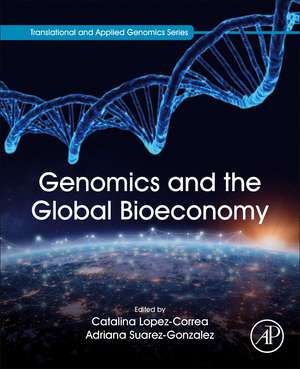Genomics and the Global Bioeconomy: Translational and Applied Genomics
Editat de Catalina Lopez-Correa, Adriana Suarez-Gonzalezen Limba Engleză Paperback – 23 sep 2022
Editors Catalina Lopez-Correa and Adrian Suarez-Gonzalez skillfully bring clarity to this diverse and increasingly impactful research, uniting various perspectives to inspire fresh innovation in driving the global bioeconomy.
- Presents concrete examples and detailed discussions that illustrate how to use genomics and omics technologies to drive the global bioeconomy
- Examines how genomics is addressing the most pressing environmental, agricultural, economic, and natural resources challenges of our time
- Features chapter contributions from international experts who are applying genomic technologies across various fields, from agriculture to biofuel production, bioremediation, biodiversity monitoring, and conservation
Preț: 672.72 lei
Preț vechi: 879.11 lei
-23% Nou
Puncte Express: 1009
Preț estimativ în valută:
128.72€ • 135.12$ • 106.84£
128.72€ • 135.12$ • 106.84£
Carte tipărită la comandă
Livrare economică 03-17 aprilie
Preluare comenzi: 021 569.72.76
Specificații
ISBN-13: 9780323916011
ISBN-10: 0323916015
Pagini: 366
Ilustrații: 70 illustrations (35 in full color)
Dimensiuni: 152 x 229 x 26 mm
Greutate: 0.6 kg
Editura: ELSEVIER SCIENCE
Seria Translational and Applied Genomics
ISBN-10: 0323916015
Pagini: 366
Ilustrații: 70 illustrations (35 in full color)
Dimensiuni: 152 x 229 x 26 mm
Greutate: 0.6 kg
Editura: ELSEVIER SCIENCE
Seria Translational and Applied Genomics
Cuprins
Part I: Synthetic biology as a pillar of the bioeconomy
1. Cellular agriculture and the sustainable development goals
2. Engineering microbial biofactories for a sustainable future
3. Computational approaches for smart cell creation in the bioeconomy era
4. Young innovators and the bioeconomy
Part II: Genomic monitoring is revolutionizing our understanding of biodiversity and ecological services
5. Environmental DNA: Revolutionizing ecological assessments with genomics
6. Informing marine shipping insurance premiums in the Arctic using marine microbial genomics
7. Genomic biosurveillance to protect the world’s forest resources
8. Metagenomics: A resilience approach to climate change and conservation of the African Glacier biodiversity
Part III: Genomics as a driver of the bioeconomy in agriculture
9. The impact of biotechnology and genomics on an ancient crop: Cannabis sativa
10. Multiomics techniques for plant secondary metabolism engineering: Pathways to shape the bioeconomy
Part IV: Why regulation and policy matter to advance the bioeconomy
11. Regulatory frameworks applicable to food products of genome editing and synthetic biology in the United States, Canada, and the European Union
12. Crop biotech: Creating the crops to face the future
13. Bioeconomy policy: Beyond genomics R&D
1. Cellular agriculture and the sustainable development goals
2. Engineering microbial biofactories for a sustainable future
3. Computational approaches for smart cell creation in the bioeconomy era
4. Young innovators and the bioeconomy
Part II: Genomic monitoring is revolutionizing our understanding of biodiversity and ecological services
5. Environmental DNA: Revolutionizing ecological assessments with genomics
6. Informing marine shipping insurance premiums in the Arctic using marine microbial genomics
7. Genomic biosurveillance to protect the world’s forest resources
8. Metagenomics: A resilience approach to climate change and conservation of the African Glacier biodiversity
Part III: Genomics as a driver of the bioeconomy in agriculture
9. The impact of biotechnology and genomics on an ancient crop: Cannabis sativa
10. Multiomics techniques for plant secondary metabolism engineering: Pathways to shape the bioeconomy
Part IV: Why regulation and policy matter to advance the bioeconomy
11. Regulatory frameworks applicable to food products of genome editing and synthetic biology in the United States, Canada, and the European Union
12. Crop biotech: Creating the crops to face the future
13. Bioeconomy policy: Beyond genomics R&D













